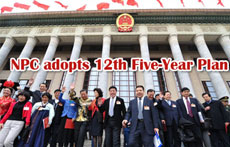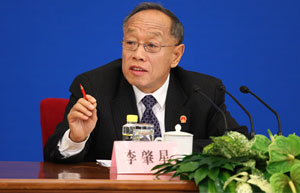Govt eyes nuclear energy as oil price rises
By Wu Jiao (China Daily)
Updated: 2011-03-11 08:14
BEIJING - A senior energy official has warned the government to be "fully aware" of the risk of imported inflation as spreading uncertainty in the oil-rich Middle East and North Africa keeps driving up the global oil price.
Zhang Guobao, former chief of the National Energy Administration, also urged the government to speed up the research and development of alternative energy, especially nuclear energy, to reduce heavy dependency on the global oil market.
| ||||
Zhang also said that the division of power in Sudan is also unlikely to have a major impact on China's oil production there as China had made preparations for the split and enjoys good relations with both the north and the south.
However, as an alarming 55 percent of China's annual oil demand has to be supplied from overseas, Zhang warned that the surging global oil price would definitely increase imported inflationary pressures on China.
The Chinese government has been increasingly concerned by inflation since the consumer price index (CPI) rose to a record 28-month high of 5.1 percent in November.
Asian stock markets fell on Thursday in the face of higher oil prices as fighting in Libya intensified, fuelling worries that mounting inflationary pressure could bite into global growth.
US crude reached $107 a barrel earlier this week due to the turmoil in Middle East and North Africa, which now produce 35 percent of total world oil output and offer rare high-quality crude oil.
In China, the surging oil price has led to price rises for downstream products and some bulk products, including coal.
Zhang, the former top energy official said that nuclear power is one of the best sources of alternative energy.
The US, with a far smaller population, has 104 nuclear reactors, while China only has 13, according to Zhang. Nuclear energy accounted for only about 0.8 percent of all primary energy sources last year.
Zhang Huazhu, former director of the China Atomic Energy Authority, who is also a member of CPPCC National Committee, agreed with Zhang Guobao.
"China should accelerate innovation in nuclear power technology to realize its energy-saving and emission-reduction commitment to the international community, and to face the challenge of climate change," said Zhang Huazhu.
Zhang Guobao said the government will invest more in the development of nuclear power technology and in the training of specialized workers.
"China has made clear its strategy of accelerating the development of technology over the next five years, and I am confident we'll reach the point that 2.2 percent of the energy we use will come from nuclear power in 2016. This is part of our efforts to reduce China's reliance on coal," he said.
Wang Jingqiong contributed to this story.







